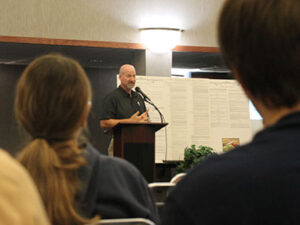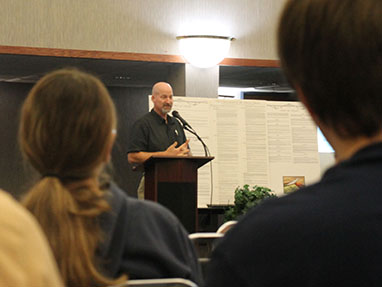By Jordan Green Editor-in-Chief
The U.S. Supreme Court may not be as polarized as some Americans believe, according to a Northwestern political science professor.
Dr. Aaron Mason spoke about that concept and more during the university’s Constitution Day forum Sept. 22.
He detailed recent Supreme Court rulings and their impact on federal agencies, states’ rights and individual liberties. Several students attended the forum and asked questions.

As Mason reviewed the outcomes and impacts of rulings handed down in 2022, he said he was “heartened” to see that the nine-member court ruled unanimously — or nearly unanimously — on several issues.
“The court is not always as divided as we might think,” Mason said.
Mason highlighted nine Supreme Court cases, including some quieter rulings that were overshadowed by the court’s landmark decision to overturn Roe v. Wade.
The first ruling he discussed, issued in the case West Virginia v. Environmental Protection Agency, limited the regulatory agency’s ability to impose new restrictions on the energy sector.
Because the EPA is a federal agency, some pundits view the ruling as an attempt to reign in executive power and a sign that Congress should pass better laws, Mason said. He called it a victory for people who believe that federal agencies have been given too much authority.
“There’s been this long-held question about how far can agencies do things on their own,” Mason said.
“The court was saying Congress has this authority. Congress has to be very careful how it delegates this authority to the bureaucracy so that the bureaucracy does not misuse that authority.”
Mason also discussed the court’s bipartisan rulings in politically charged cases. In one case, the court ruled against a vaccine-or-test policy heralded by President Joe Biden. In another, the court ruled that Biden could discontinue former President Donald Trump’s so-called “wait-in-Mexico” immigration policy.
Though conservative people may agree with a ruling that liberals disdain, and vice-versa, the court applied the Constitution equally in both cases, Mason said.
“The only difference is the occupant of the White House,” Mason said.
The court also ruled in favor of religious liberty in several cases. The Court ruled that the City of Boston violated the First Amendment by refusing to allow the Christian flag to fly above City Hall while allowing other religious and non-religious groups to fly their own flags.
In Kennedy v. Bremerton School District, the court said in a 6-3 decision that a school football coach had the right to kneel and pray at the 50-yard line during a game. At issue was the idea of separation of church and state.
“I’d pray at the endzone because that’s where you’re trying to get,” Mason joked. “That’s heaven.”
The court also ruled in favor of states’ rights and gun rights in some cases. Overall, the court’s decisions tended to favor local government rather than federal government.
Mason described some of the rulings as “far-reaching,” even though they didn’t receive much media attention. However, even in some more controversial cases, the court ruled less along ideological lines than many Americans think.
“There’s actually sometimes more consensus on the court than we give them credit for. And that’s a good sign,” Mason said. “It’s a good sign in the sense that we don’t always have to be afraid that the court is so divided.”
The forum was open to students and the public. Paul Cole, a retired local pastor, said he appreciated the discussion.
“It was excellent,” he said. “I think we’ve got a great Constitution, and I want to understand more about it. I think we need to study more about it.”

